
The following outline is provided as an overview of and topical guide to theatre:
In common with other European countries, the most frequent and most popular form of theatre in Poland is dramatic theatre, based on the existence of stable artistic companies. It is above all a theatre of directors, who decide on the form of its productions and the appearance of individual scenes. There is no strict division in Poland between theatre and film directors and actors, therefore many stage artists are known to theatre goers from films of Andrzej Wajda, for example: Wojciech Pszoniak, Daniel Olbrychski, Krystyna Janda, Jerzy Radziwiłowicz, and from films of Krzysztof Kieślowski, actors such as Jerzy Stuhr, Janusz Gajos and others.

Helena Modrzejewska, known professionally as Helena Modjeska, was a Polish actress who specialized in Shakespearean and tragic roles. She was successful first on the Polish stage. After emigrating to the United States, she also succeeded on stage in America and London. She is regarded as the greatest actress in the history of theatre in Poland.
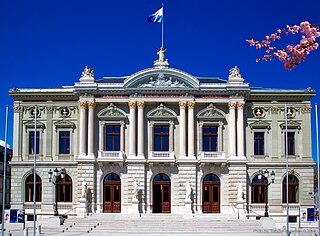
Grand Théâtre de Genève is an opera house in Geneva, Switzerland.

The Grand Theatre in Warsaw, known in full as the Grand Theatre–National Opera, is a theatre and opera complex situated on the historic Theatre Square in central Warsaw, Poland. The Warsaw Grand Theatre is home to the Polish National Ballet and has a seating capacity of over 2,000.

Krystyna Jolanta Janda is a Polish film and theater actress best known internationally for playing leading roles in several films by Polish director Andrzej Wajda, including Man of Marble and Man of Iron.

The theatre of the Czech Republic has a rich tradition in all genres, including drama, opera, ballet and dance, puppet theatre, black light theatre etc.

Gdańsk Shakespeare Festival is an international theatre festival devoted to the idea of the Elizabethan theatre, and especially to the works of William Shakespeare. The event was first organized in 1993, on the initiative of Theatrum Gedanense Foundation, which had been created by Professor Jerzy Limon and Władysław Zawistowski, with Charles, Prince of Wales as its patron. Its original name, "Gdańsk Shakespeare Days" was transformed into "Gdańsk Shakespeare Festival" in 1997, during the celebration of Gdańsk's millennium.

Robert Gonera is a Polish film, stage and television actor. He played leading roles in Krzysztof Krauze's political drama Street Games and the thriller The Debt, for which he received Best Actor at the Polish Film Awards:Eagles. He became widely known after starring in a record audience television series L for Love aired on TVP2.

The Internationale Maifestspiele Wiesbaden is a theater festival in Wiesbaden, Germany. Established in the late 19th century after the Bayreuth Festival, the festival is one of the most distinguished international theatre and music festivals in the world. It is presented annually in May at the Hessisches Staatstheater Wiesbaden, the State Theatre of Hesse in the capital Wiesbaden. The festival currently features performances of operas, ballets, plays and musicals. Visiting companies, mostly from European theaters, present their recent productions along with performances of the Theater Wiesbaden. Concerts from a wide array of music genres are featured as well as artistic circus acts and modern dance presentations. Lectures, recitals, cabaret performances, art showings and readings are also part of the program.
Kirill Turichenko, or Kyrylo Turychenko, was born January 13, 1983, in Odesa, Ukraine. He is a Ukrainian musician, singer and actor. Turichenko has been a member of the Russian boys band Ivanushki International since 2013.
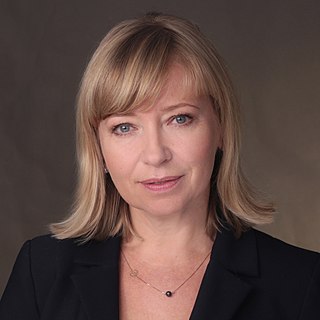
Dorota Segda in Kraków, Poland, is a Polish theatre, film and television actress. Besides acting, she is also a Professor of Theatre Arts, and the Rector since 2016, at the AST National Academy of Theatre Arts in Kraków. In 2015, she was awarded Poland's Silver Medal for Merit to Culture – Gloria Artis.
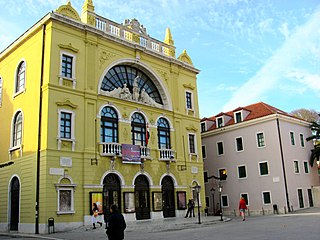
The Croatian National Theatre in Split is a theatre located in Split, Croatia. Originally opened in 1893, the theatre is owned and operated by the City of Split and is one of the oldest surviving theatres in Dalmatia.

Krzysztof Warlikowski is a Polish theatre director. He is the creator and artistic director of Nowy Teatr in Warsaw.
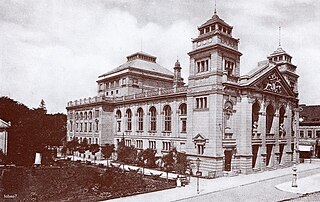
The Municipal Theatre of Bydgoszcz is a former theatre building which stood in Bydgoszcz, Poland from 1896 to 1946.
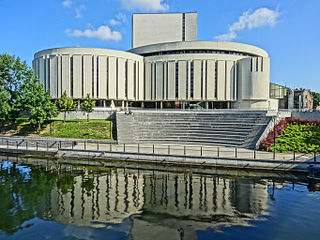
The Opera Nova is an opera house in Bydgoszcz, Poland. It was established in 1956, and it also plays the role of a musical theatre. It is one of the 10 opera houses in Poland and the only one of this size in the Kuyavian-Pomeranian Voivodeship. Opera Nova also welcomes the scene of the Bydgoszcz Buratino Puppet Theatre.

Adam Mickiewicz Theatre is a theatre located at the Theatre Square in the Old City in Cieszyn, Poland.
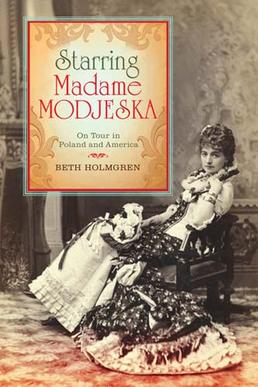
Starring Madame Modjeska: On Tour in Poland and America is a 2011 biography by Beth Holmgren about the Polish actress Helena Modjeska. From a young age, Modjeska's interest in performing was shaped by her brothers and by a tutor who introduced the family to the works of great writers. Eventually, Modjeska would be acknowledged as a reigning star in Poland, and be equally celebrated when she toured America. Holmgren is Professor and Chair of the Department of Slavic and Eurasian Studies, Duke University. She is also on the faculty of the university's Gender/Sexuality/Feminist Studies, Jewish Studies, and Theater Studies. Prior to the publication of this book, she had written articles on Modjeska for The Polish Review, Indiana Slavic Studies and Theatre Journal.

The Old Theatre in Lublin - an impresario theater in Lublin opened in 1822. Initially it housed the Lublin Drama and Opera Stages, and in the 20th century also a cinema.


















